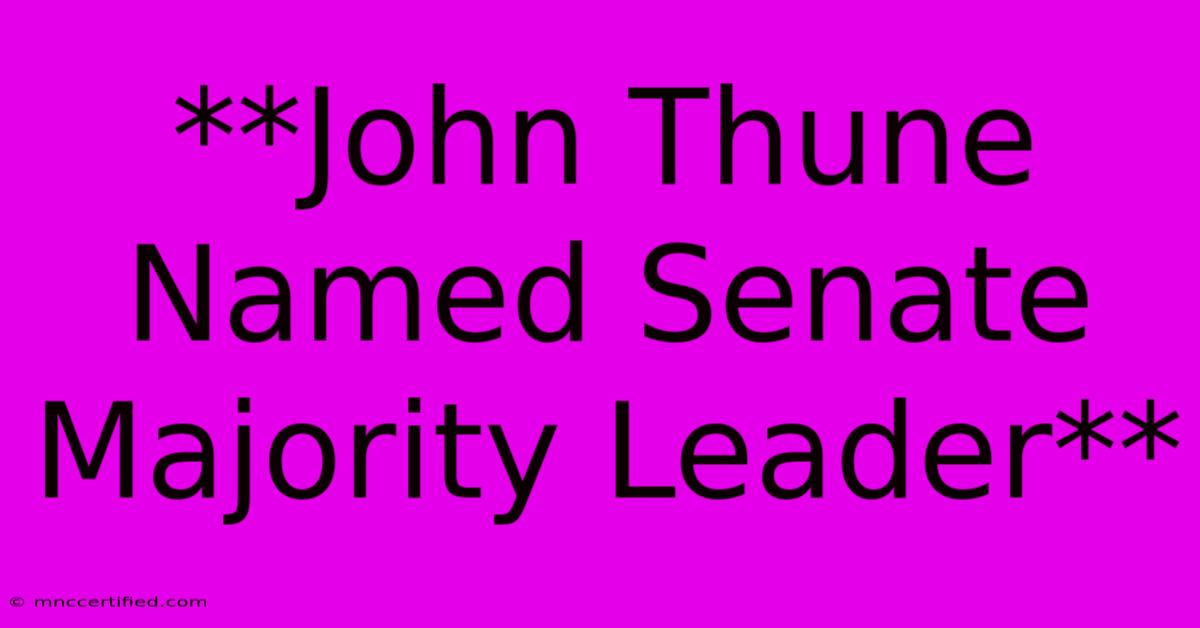**John Thune Named Senate Majority Leader**

Table of Contents
John Thune Named Senate Majority Leader: A New Era for the Republican Party?
John Thune, the South Dakota Senator and a prominent figure in the Republican Party, has been named as the new Senate Majority Leader, succeeding Mitch McConnell who held the position for over a decade. This announcement marks a significant shift in the leadership of the Republican caucus and raises intriguing questions about the future direction of the party.
Thune's Rise to Power: A Look at His Background
Thune's journey to the top leadership position in the Senate has been marked by steady progress and strategic maneuvering. Elected to the Senate in 2004, he quickly established himself as a rising star within the Republican Party, known for his strong conservative credentials and his commitment to fiscal responsibility.
He served as the Senate Republican Whip from 2019 to 2023, a role that gave him a strong understanding of the internal dynamics of the Senate and the ability to build consensus across diverse factions within the party.
Thune's Priorities: What to Expect Under His Leadership
As the new Senate Majority Leader, Thune faces a number of challenges and opportunities. While he has yet to fully articulate his agenda, his past statements and actions offer some insights into his priorities:
- Economic Growth: Thune is expected to focus on policies that promote economic growth and job creation. He has been a vocal advocate for tax cuts and deregulation, believing that these measures are essential for stimulating the economy.
- Fiscal Responsibility: Thune is a strong proponent of fiscal conservatism and has been a critic of excessive government spending. He is likely to prioritize efforts to reduce the national debt and control federal spending.
- National Security: As a member of the Senate Armed Services Committee, Thune is deeply interested in national security issues. He has been a consistent advocate for strong military spending and a robust national defense.
Challenges and Opportunities for Thune
Thune's leadership will be tested by a number of challenges, including:
- A Divided Senate: The Senate remains narrowly divided, with the Republicans holding a slim majority. This means that Thune will need to build strong relationships with moderate Democrats and find common ground on key issues to pass legislation.
- Internal Divisions: The Republican Party is increasingly divided on a range of issues, from immigration to social policy. Thune will need to manage these divisions and maintain party unity to effectively govern.
- The 2024 Presidential Election: The 2024 presidential election is already shaping up to be a highly competitive race. Thune's leadership will be a major factor in the Republicans' success or failure in retaining control of the Senate.
Conclusion: A New Era for the Republican Party
John Thune's ascension to the Senate Majority Leader position marks a significant moment for the Republican Party. As he takes the reins of the caucus, he faces a complex and challenging political landscape. His ability to navigate these challenges and build consensus will be crucial in shaping the future of the Republican Party.
Keywords: John Thune, Senate Majority Leader, Republican Party, Mitch McConnell, Senate, Congress, leadership, politics, United States, 2024 election, national security, fiscal responsibility, economic growth

Thank you for visiting our website wich cover about **John Thune Named Senate Majority Leader**. We hope the information provided has been useful to you. Feel free to contact us if you have any questions or need further assistance. See you next time and dont miss to bookmark.
Featured Posts
-
Pete Hegseth Veteran Fox Host Now What
Nov 14, 2024
-
Who Is John Thune Senate Leader Profile
Nov 14, 2024
-
Wembanyamas 50 Point Outburst Leads To Victory
Nov 14, 2024
-
Kittery Trading Post Fishing Report
Nov 14, 2024
-
Whoopi Goldberg Birthday Cake Order Dispute
Nov 14, 2024